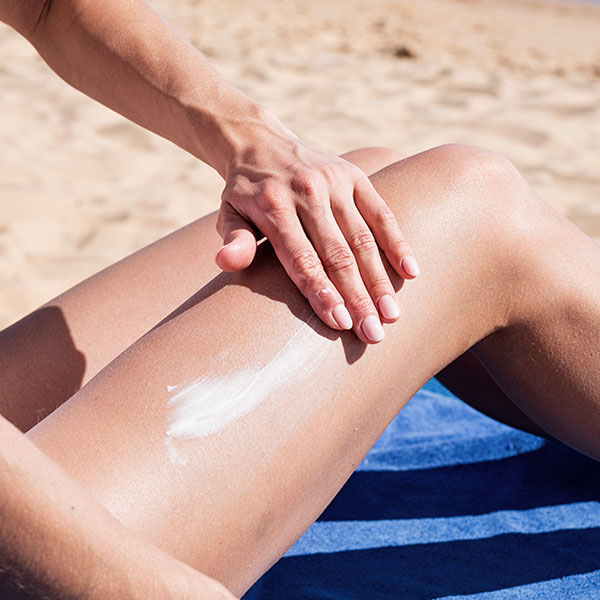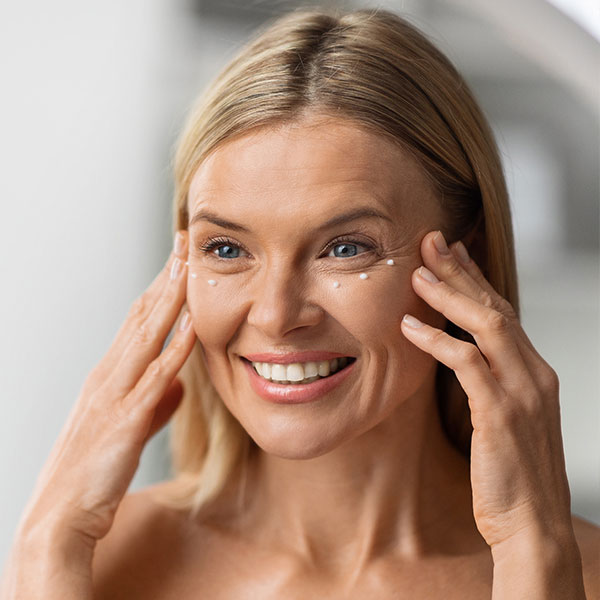- Why you should use face cream with sunscreen, and not only in summer.
- Can I use facial sun cream if I have oily skin?
- When should I use an anti-spot facial sun cream?
- Discover the benefits of mimosa extract in facial sun cream
- Is it better to use tinted facial sunscreen or sunscreen and make-up?
The sun can be your best friend but also your worst enemy. Your body needs the sun to improve your mood, strengthen your bones, muscles and immune system. This is all thanks to vitamin D, a vitamin that can only be synthesised by the sun’s rays. According to experts, an exposure of 8 to 15 minutes in summer is enough to get the daily dose your body needs.
If you are in the sun for more than a quarter of an hour, you need to protect your skin against the negative action of ultraviolet rays. It doesn’t matter whether it’s winter or summer, sunny or cloudy. If you want to avoid premature ageing, dehydration and spots, it is essential to use a quality sunscreen. And especially on your face, the area of your body most exposed to the outdoors all year round.
Why you should use face cream with sunscreen, and not just in summer
Did you know that wind, cold and temperature changes also take their toll on your facial skin? When temperatures drop, oil production decreases and your skin’s natural protective film becomes thinner. Your face becomes dehydrated and you may notice a feeling of tightness, redness and flaking. And over time, the premature appearance of wrinkles.
Face creams with sun protection will be our best ally all year round, even in winter. Toskani’s Sun Protection Cream is specially designed to prevent facial dehydration even in winter. Its main active ingredient, urea, has a high moisturising power to combat the effects of cold and wind on the face.
Can I use facial sunscreen if I have oily skin?
If you have oily skin you need the best sunscreen cream for oily skin. A cream that moisturises and protects you from the sun specifically for oily skin.
TSK Sun Protection Cream PRO contains retinol, a vitamin A derivative known for its ability to penetrate into the deepest layers of the skin to renew cells and stimulate the formation of collagen and elastin.
Sun Protection Cream PRO is an anti-acne facial sunscreen because retinol also inhibits the production of excessive oil, reducing shine and preventing clogged pores.
Retinol is perfect for preventing and treating acne due to its anti-inflammatory action. It is exfoliating and regenerating and also softens acne marks and scars. Combined with Mimosa tenuiflora extract, which has antibacterial properties, Sun Protection Cream PRO will give you the sun protection you need to improve the balance of your facial skin.
When should I use an anti-spot facial sun cream?
Spots appear due to an excess of melanin in certain areas of the skin, especially on the face. In addition to excessive unprotected exposure to the sun, blemishes can be related to certain medications or to genetic or hormonal factors.
Melanin is a substance that pigments the skin, hair and eyes. Melanin is responsible for the tan you love. It is your skin’s defence system to absorb ultraviolet rays and prevent cell damage.
But melanin is not foolproof. Prolonged unprotected exposure to the sun can lead to sunburn and, over time, the appearance of spots. You can avoid this by using an anti-spot facial sunscreen with 50 protection such as Sun Protection Cream or Sun Protection Cream Pro and enjoy the outdoors without fear of premature ageing of your face.
Discover the benefits of mimosa extract in facial sun cream
In addition to urea and retinol, Sun Protection Cream includes one of the star products in cosmetics: Mimosa tenuiflora extract, known in Mexico as tepezcohuite. The properties of this tree were already known to pre-Columbian cultures but it was rediscovered in the 1990s when the powdered bark was used to treat burns on patients of the 1985 earthquake.
Known as the skin tree, Mimosa tenuiflora extract, in addition to its regenerative properties, is anti-inflammatory and antibacterial (anti-acne), healing, firming and anti-ageing, thanks to its high tannin (antioxidant) content. Antioxidants increase the skin’s impermeability by blocking the action of free radicals.
The mimosa extract added to the facial sun cream also promotes deep hydration due to its high amino acid content. Amino acids help to reduce water loss, keeping your facial skin hydrated and smooth for longer.
Is it better to use tinted facial sunscreen or sunscreen and make-up?
This is the big question we ask ourselves when winter arrives and we like our face to look slightly tanned. To answer it, we are going to analyse the advantages and disadvantages of each product.
Tinted facial sunscreen aims to protect the skin from the sun’s rays and gives us a touch of colour. It slightly covers imperfections. There are usually only two shades on the market, or one that can be adapted to any skin tone.
The purpose of make-up with sunscreen is to cover imperfections, neutralise redness or cover wrinkles. As an extra, it provides protection and you can find many shades to suit your skin colour.
Therefore, it depends on what you need at any given moment: a natural tone with protection or a great covering power that also protects you from the sun and inclement weather.
At Toskani we are researching these products to be able to respond to your needs with the most innovative solutions.
Would you like to know more about the tanning process and how your beauty salon can help you achieve a perfect tan and prevent skin ageing? Find out in the article “How to get an even and healthy tan this summer”!



